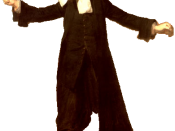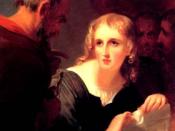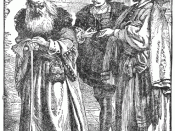Conflicts in "Merchant of Venice" occur as a result of four major life themes: love, money, prejudice and disguise. Shylock, the Jewish moneylender is usually, and somewhat unjustly, held responsible for many of these conflicts. Though Shylock's behaviour is, in many ways, evil,and should by no means be exonerated, the conflicts he does cause are most often merely his vengeful attempt to respond to the prejudices he has experience caused by his religion. In the time of Shakespeare, prejudices were deep-seated and common. Most of society (the white Christians) regarded anybody who was different as inferior and worthy of suspicion, especially those with dark skin or alternate faith. These feelings of superiority were classically expressed by ostracism and isolation of the involved party.
Most frequently throughout the play, even the most noble members of Venetian society, especially Antonio, refer to Shylock in only derogatory terms such as "cur", "devil" and "dog"(I, iii) which are all cruel references to animals and subhuman beings.
It is as a result of these constant attempts to steal his dignity that Shylock first bears his "ancient grudge" against Christians. It has required that he seek solace in the moneys he earns, considering them more dear to him than ever before following the abandonment he receives from both his servant Lancelot Gobbo and his daughter Jessica. Before she left, he treated her with care, considering her "his treasure" (II, v, 4) while trying to ensure that she was unaffected by the evil of Christians. Once she has left him and stolen much of his money, the object of his affections and obsessions becomes the money, as he wishes that "my daughter were dead at my foot and the jewels in her ear" (III, i, 69-70). This money is accumulated by charging interest, something...


